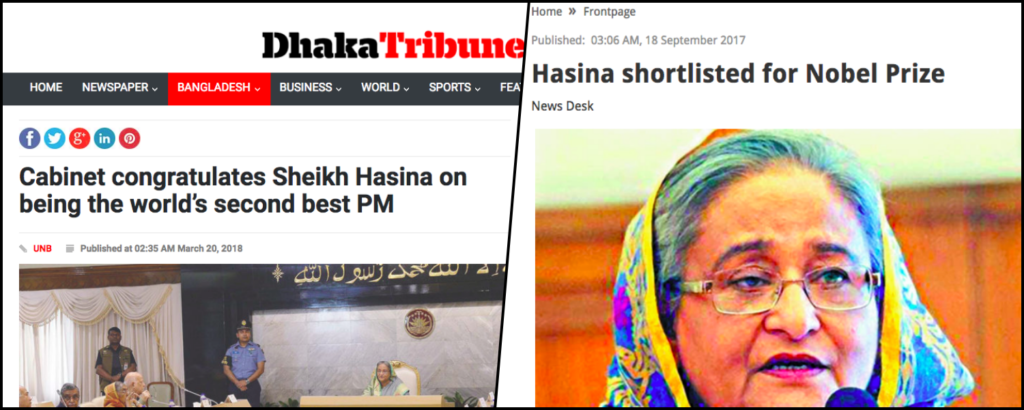By Nava J Thakuria
Is it usually possible to get hundreds of newspaper-articles, prepared by independent experts on Bangladesh politics, published in various countries within a few weeks, particularly at a time when the south Asian nation is approaching national elections early next year? Or was it a sponsored campaign by a number of writers with dubious credentials (even may not exist on Earth), who took it as a mission to lavishly praise the incumbent Bangla Prime Minister Sheikh Hasina Wajed for their personal gains ?
A recent Agence France-Presse (AFP, based in Paris) feature claims that many of those articles were ‘published by Chinese state news agency Xinhua, leading media across Asia, and quoted by the South Asia Brief of the Washington-based Foreign Policy magazine’. Investigation found that names forming a network of so-called experts are producing regular op-ed pieces, some posing as academics from leading global universities, some using stolen headshot photos, and others making up quotes from real analysts, added the report.
AFP analyzed more than 700 articles published in at least 60 domestic and international news sites with bylines attributed to 35 names, all of which appeared for the first time. While it was not possible to prove if all investigated bylines were real, no online presence apart from the articles could be found and none had a visible social media profile. The articles overwhelmingly endorsed narratives pushed by the Awami League led government in Dhaka, with some posted on Bangla government websites.
Speaking to this writer from Dhaka, a Bangladeshi editor (who wanted anonymity) informed that he too received a number of articles (with the early prediction of Hasina’s convincing win in the next Parliamentary polls) since the end of last year with a request for publication. He admitted that some of those articles were even published in various Dhaka-based newspapers, probably in good faith. Soon they stopped publishing those articles after it was found that one particular article was re-sent with a different byline and the trend repeated.
He even revealed that one article was sent from Assam too (but denied to inform the writer’s name) for publication in his newspaper. The article was written in correct English (with spellings inclined to the American accent) and contained extraordinary details on Bangladesh politics (unusual for a foreign writer), he pointed out, adding that a group of editor-journalists from northeast India visited Bangladesh a few months back under a sponsored program and someone among them might had sent the article (or his/her name was used by the organisation, which had orchestrated the entire episode) !



